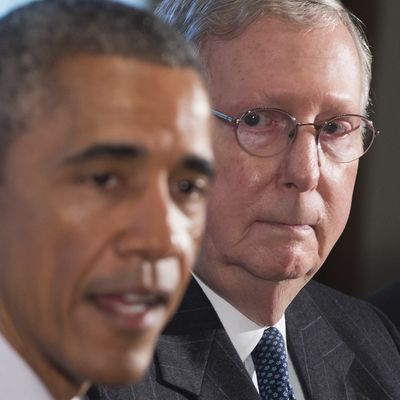
On Friday, President Obama told a private call of his former aides that President Trump had mismanaged the pandemic and that his efforts to undo Michael Flynn’s guilty plea threatened the rule of law. On Sunday, President Trump retweeted an accusation that President Obama was “the first Ex-President to ever speak against his successor, which was long tradition of decorum and decency.” Yesterday, Senate Majority Leader Mitch McConnell repeated the complaint in an interview with Lara Trump.
“I think President Obama should have kept his mouth shut,” complained the Senate Majority Leader. “I think it’s a little bit classless, frankly, to critique an administration that comes after you.”
McConnell has spent years sitting idly by while Trump has shredded norms of presidential conduct. And not just issues of superficial manners — important democratic norms like “don’t encourage your supporters to commit political violence” and “don’t threaten to imprison your rivals,” among many others. McConnell’s sudden emergence as defender of presidential-conduct norms is absurd.
In this case, the “tradition” that a president should not criticize his successors is somewhere between weak and completely nonexistent. As an Associated Press fact-check noted, Theodore Roosevelt, Jimmy Carter, and Bill Clinton are among the retired presidents who have done this.
To the extent it exists, the tradition of withholding criticism of a successor is a very recent one, primarily associated with the two Presidents Bush, both of whom made a big point of refusing to criticize the presidents who followed them. But this decision had a clear strategic element: Both Bushes left office deeply unpopular. Their fellow Republicans devoutly wished for them to disappear and saw their engagement in public debate as a liability. Obama left office with a 60 percent approval rating. The norm that presidents should stay out of partisan debate is one that Republicans have a strong recent interest in maintaining, as it would sideline unpopular Republicans and popular Democrats.
In any case, Obama’s remarks were fairly gentle. He made his comments in a private setting (albeit without making much effort to contain their publication). That didn’t stop McConnell from repairing to his fainting couch.
Neither did the fact that Trump has attacked Obama hundreds of times, often hysterically, and sometimes including spurious charges of criminality. At minimum, this would seem to obviate any requirement that Obama keep his silence. McConnell has the extraordinary chutzpah to witness the president spending years lying about his predecessor and setting the stage to criminalize him, and to then get indignant at the predecessor for calling this a threat to the rule of law in private remarks.
McConnell added to his complaint the inadvertently comic detail that Obama shared blame for the coronavirus: “Clearly,” he told Lara Trump, “the Obama administration did not leave to this administration any kind of game plan for something like this.”
That isn’t clear at all! In fact, as Politico has reported, Obama left Trump a detailed and highly specific plan for something exactly like this:
Maybe McConnell should decide that there’s a new tradition: It’s now classless for a president to hand over to his successor detailed plans to handle disasters, because if the successor is incompetent enough to ignore them, he’ll look bad.































